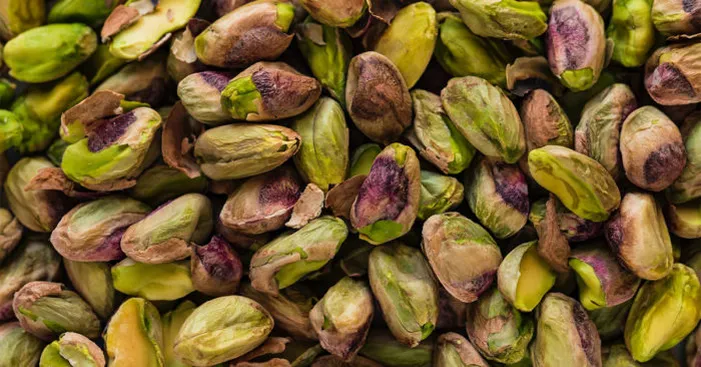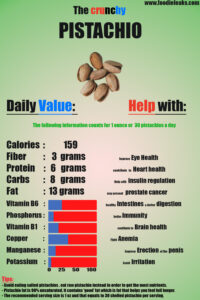Table of Contents

Pistachio benefits and side effects go hand in hand.
These delicious and nutritious green nuts, enjoyed for centuries, are packed with heart-protective nutrients, antioxidants, and anti-inflammatory compounds.
But as with any food, there are also some potential side effects to consider. (1)
In this blog post, we will take a closer look at the many benefits of pistachios, as well as any potential side effects to be aware of.
Whether you’re a pistachio lover or just curious about this tasty snack, this post is for you!
Let’s start with a little bit of history…
Pistachio history:

There are 11 different species of pistachios around the world and the most exploited one is Pistacia vera. (2)
The origins of pistacia vera link to the desert parts of Central Asia.
It is because pistachio trees require a long hot summer to ripen the fruits.
Also, they need an annual cold winter period to induce flowers, both of these conditions are specific to deserts.
Nowadays, wild pistachio trees still grow in Afghanistan, Iran, Uzbekistan, and Tajikistan.
Furthermore, the deep historical roots of pistachio cultivations date back to the Assyrian era, 4000 years ago.
Few thousand years later, Romans brought pistachios to Europe and from there they spread all around the world.
Today, there are more than 18 countries that grow pistachios including Iran, USA, Syria, Turkey, Italy, and Tunisia.
The international production of this nut has known two major providers:
– The United States of America with almost 40% of global production. (3)
– Iran with 30% of global production.
California is known for its pistachios as it provides 35% for the world.
Pistachio benefits and side effects:

Rich in nutrients, pistachios are among the most well-balanced snacks.
Nutritionists recommend eating non-salted pistachios as they hold more natural values.
Also with salt, pistachios have more calorie intake and they can raise blood pressure.
Pistachios benefits:
These small nuts are full of magnesium and vitamins.
They sit on the top of the list of nuts as the healthiest nut.
Pistachios contain fat, not the saturated type but the good type.
They are also known to have fewer calories than most other nuts in the same family.
The following pistachio nutritional data counts for 1Oz (30 nuts):

- Calories: 159
- Carbs: 8 grams
- Fiber: 3 grams
- Protein: 6 grams
- Fat: 13 grams
- Vitamin B6: 28%
- Phosphorus: 11%
- Thiamine: 21%
- Copper: 41%
- Manganese: 15%
- Potassium: 6%
No wonder why pistachios have so many benefits!
Here are 10 health benefits of pistachios:
Good for eye health:
As pistachios contain carotenoids, they are really beneficial for a good sight.
This nut also has a lot of antioxidants that help fight aging eye diseases.
One of those antioxidants found in pistachio is Zeaxanthin, which helps to protect the eyes from radiation. (4)
In addition to that, pistachios are rich in vitamin E, a nutrient that is essential for cell regeneration and though helps regenerate the cells that are damaged in the eyes due to aging.
Good for heart health:
The diversity of the combination of antioxidants and minerals in pistachios is proven to help with blood circulation.
Almost 90% of the fat found in pistachios is unsaturated fat, which helps to lower the level of cholesterol in the blood and then reduce the risk of heart disease. (5)
Pistachios are rich in potassium, one of the most famous minerals that help regulate blood tension.
Help with insulin regulation:
According to the University of Toronto, eating pistachios with or after your meal will help lower blood sugar levels. (6)
Healthy prostate:
As proven by researchers, food that is rich in carotenoids and vitamin E reduces the risks of prostate cancer. (7)
The number of antioxidants in pistachios will help neutralize your body from all the junk accumulated before it turns into cancerous cells.
Intestines health:
Pistachios are full of fibers.
In fact, a handful of these nuts provides 3g of fibers and that makes 12% of the daily recommended value.
Fibers have a water-absorbing power, they stimulate intestinal contractions and promote bacterial activity in the colon. The result is having smoother digestion. (8)
Good Immunity:
One of the many vitamins needed for better resistance facing diseases is vitamin B6.
It only takes a handful of pistachios to give you 30% of the daily recommended value of vitamin B6.
Healthy brain:
Pistachio is rich in vitamin B1 which makes them very beneficial for our nervous system.
This vitamin is crucial to the creation of our brain cells, it creates a fiber cover around the nerves which is used to transmit messages from one nerve to the other. (9)
Fight anemia:
This nut is filled with copper content, the component responsible for the absorption of Iron from food into the body.
More absorbed Iron means better chances of fighting Anemia.
Improve erection of the penis:
More than other nuts, pistachios are full of aphrodisiac content.
This substance is proven to increase sexual drive.
A study was made with a group of men who were given 100 grams of pistachios daily for 3 weeks. (10)
The results were mind-blowing!! These men experienced an increase in erectile function by 50% and it was proven by ultrasound tests in the blood flow of the penis.
Avoid irritation:
Pistachio is full of anti-inflammatory content including vitamin E and A, which help reducing irritation caused by any sort of problem within your body. (11)
Although, pistachios are full of benefits they still have side effects depending on whether they are salty or not and on the daily dose, so what are the pistachio side effects?
Pistachio serving size:

Pistachios are more commonly used in desserts as they have a distinguished flavor and texture.
They are also considered a healthier snack than chips.
Ever heard of this quote: “Too much honey becomes sour”!?
This also applies to pistachios, it is true that they are very beneficial for our health but portion control is always necessary!
The recommended serving size is less than a cup.
In fact, it’s just 1 Oz and that equals 30 shelled pistachio per serving.
Although these nuts are low in fat, they hold a high-calorie value, with 1 cup of pistachios you get 700 calories and 56 g of fat.
With a little math, you get almost 100 calories per 1 Oz from pistachios, which is a good balance for a nutritious snack!
Side effects of pistachios:

As long as you don’t eat too many pistachios (keep it reasonable), a handful or two per day would help your body in many ways and won’t have any side effects!
However, too many pistachios a day though would cause you some health problems including:
Risk of kidney stones:
Pistachios contain oxalates and methionine, and once these two reach the body they get converted into an amino acid called cysteine.
Eating too many pistachios would increase the risk of getting cysteine kidney stones. (12)
Risk of high levels of manganese:
These nuts are full of manganese, which is good for many body functions.
For instance, manganese helps the body to absorb nutrients and many physiological processes.
However, too much of this mineral can cause cramps, headaches, and hallucinations. (13)
The human body contains 10 to 20 mg of manganese mostly in the bone structure, heart, kidneys, liver, and kidneys.
Anything beyond that amount and we may experience hallucinations, cramps, headaches, and neurological disorders.
You should know that 1 cup of pistachios contains more than 120% of our daily need for manganese.
Thus, nutritionists recommend consuming no more than 1oz (30 pistachios) a day as that provides 15% of our manganese daily needs.
Risk of increase in blood pressure:
Not generally common for all pistachios, the roasted salty type has a high level of sodium.
Could cause an increase in weight:
Even though pistachios are lower in carbs compared to other nuts, they can still promote weight gain.
Actually, just 100 grams of pistachio, more like 3 handfuls, provides almost 600 calories.
That is more than the number of calories of spaghetti, pizza, and cheese!
Do pistachios have melatonin?
Melatonin is a hormone produced by the brain when there is darkness around.
Although, due to the over-exposure to light nowadays, melatonin production can be blocked.
Most doctors prescribe external melatonin intake as a solution for insomnia, as it helps to tell your brain its night time and then you feel sleepier. (14)
A dose of 0.2 grams of melatonin is recommended as a dose for someone who never had melatonin intake before, as too much of it can break your sleeping cycles.
Researches proved that pistachios contain 660 nano-grams of melatonin per one gram.
The recommended daily intake of pistachios, as mentioned above is 1 ounce, which is almost 30 grams.
With 30 grams of pistachio, you will have 20,000 nanograms of melatonin, and that is 10% of the safe dose of melatonin intake.
High sodium in pistachio butter:
Pistachio butter have is used in many recipes such as ice cream, filling for a croissant, tarts …
It is also used for savory dishes to add a nutty flavor to the recipe.
Homemade pistachio butter is made with raw nuts and has a very small amount of sodium.
Nonetheless, this doesn’t apply to most of the pistachio butter sold in the market.
1 ounce of pistachio butter (4tbsp) offers 10% of our daily need in sodium and that is safe.
However, we should take into consideration that we do get sodium from other types of food.
An excessive intake of sodium may lead to high blood pressure and cardiovascular diseases.
Thus, pistachio butter consumption should be moderate to avoid the risk of consuming too much sodium.
Intolerance reaction:
Some people suffer from non-tolerance to certain food, make no mistake this differs from allergies.
For instance, food intolerance is a “lighter version of allergy” as it mostly results only in digestive problems.
Specifically, people with Fructan intolerance may develop digestive problems if they consume pistachios.
Fructan is a type of carbohydrate that exists in wheat products, garlic, cabbage, broccoli, and pistachios… (15)
Symptoms of a pistachio intolerance may be:
- Nausea.
- Abdominal pain.
- Diarrhea.
- Shortness of breath.
Pistachio allergy:
This is not exclusive to pistachio, however people with nut allergies must stay away from pistachios as well.
In fact, nut allergy is a very common food allergy and counts for more than 1% of Americans. (16)
Usually, people who are allergic to walnuts, pine, cashew, peanuts… are also allergic to pistachios.
If a person with a nut allergy consumes even a small amount of pistachio, he can have an anaphylactic reaction.
Usually, allergic reactions start within half an hour of consumption and they may be:
- Diarrhea.
- Nausea.
- Cramps and abdominal pain.
- Difficulty swallowing and breathing.
- Swollen lips and tongue.
- Skin rash.
- Excessive coughing.
- Shortness of breath.
- Strokes and passing out (rare).
Kidney problems:
Pistachios do not cause kidney problems, however, they may complicate an already existing one.
Pistachios are a good source of potassium with 1 ounce offering more than 10% of potassium.
Potassium helps us maintain electrolyte balance and improve body metabolism.
However, for people with kidney disorders, the kidneys cannot remove excess potassium from the body.
Consequently, the levels of this mineral raise which may lead to irregular heartbeat and other problems.
Salmonella infection:
Many studies show that pistachios may contain salmonella, a harmful bacteria that can grow in dried fruits.
Salmonella is a type of bacteria that affects the intestinal tract and eventually, the body gets rid of it through defecation.
Nonetheless, once it gets into the body it may contaminate the body for up to 7 days. (17)
Among the symptoms of salmonella infection:
- Diarrhea.
- Fever.
- Abdominal cramps.
- Rash.
- Bloody urine.
Usually, the most vulnerable groups are the elderly and children younger than 5 years old.
In those cases, we should not avoid raw pistachios and Roast them instead as that kills any possible salmonella content.
Excessive fiber content:
Pistachios are full of fibers with more than 14% of our daily needs in just a handful (1oz, 30g).
Make no mistake, fiber consumption is very essential for the proper functioning of the digestive system.
But, too many fibers may lead to many side effects which are not helpful to us.
Specifically, it may lead to stomach aches, abdominal pain, and neurological disorders.
All of the side effects of pistachios are related to high daily intakes, as long as you keep your consumption of pistachios moderate you should not be worried about any of the above side effects.
References:
(1): Do Pistachios Help or Hurt Weight Loss?
(2): pistachio | Description, Uses, & Nutrition | Britannica
(3): USDA estimates record harvest of American and Turkish pistachio nuts (freshplaza.com)
(4): Dietary Sources of Lutein and Zeaxanthin Carotenoids and Their Role in Eye Health (nih.gov)
(5): Diets Containing Pistachios Reduce Systolic Blood Pressure and Peripheral Vascular Responses to Stress in Adults With Dyslipidemia (nih.gov)
(6): Pistachios Help Regulate Blood Sugar Levels in People With Type 2 Diabetes (prnewswire.com)
(7): Could eating pistachios prevent cancer? – UF Health Podcasts
(8): Effects of almond and pistachio consumption on gut microbiota composition in a randomised cross-over human feeding study – PubMed (nih.gov)
(9): New Research Earns Pistachios ‘Superfood’ Status For People With Desk Jobs (prnewswire.com)
(10): Pistachio diet improves erectile function parameters and serum lipid profiles in patients with erectile dysfunction | International Journal of Impotence Research (nature.com)
(11): The Anti-Inflammatory and Antioxidant Potential of Pistachios (Pistacia vera L.) In Vitro and In Vivo (nih.gov)
(12): Eating, Diet, & Nutrition for Kidney Stones | NIDDK (nih.gov)
(13): HEALTH EFFECTS – Toxicological Profile for Manganese – NCBI Bookshelf (nih.gov)
(14): The effectiveness of melatonin for promoting healthy sleep: a rapid evidence assessment of the literature (nih.gov)
(14): The effectiveness of melatonin for promoting healthy sleep: a rapid evidence assessment of the literature (nih.gov)
(15): Dietary fructose intolerance, fructan intolerance and FODMAPs (nih.gov)
(16): Nut allergies – Better Health Channel
(17): Salmonella (Salmonellosis) | FDA
